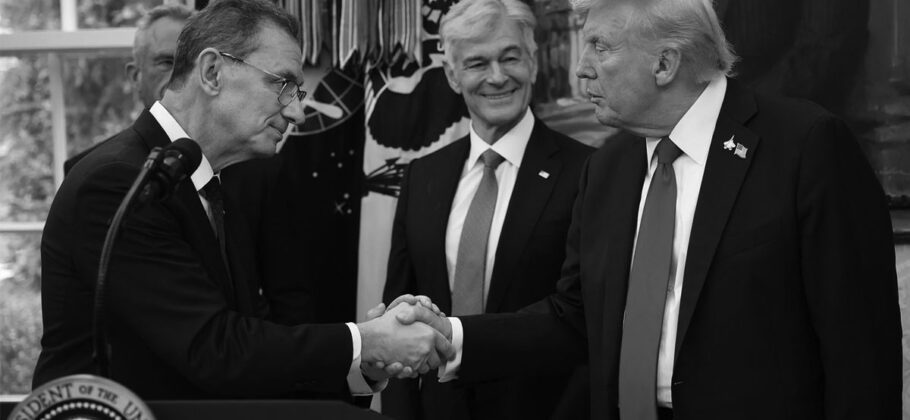A New Approach to High Costs
On September 30, 2025, President Donald Trump unveiled a far-reaching deal with Pfizer designed to reduce the cost of prescription drugs for Americans. In the Oval Office, with Pfizer CEO Albert Bourla standing nearby, Trump declared that the move would save “hundreds of millions of dollars a year” for both taxpayers and consumers.
The announcement also included the launch of TrumpRx, a government-run website where Americans will be able to purchase medicines directly from manufacturers at heavily discounted prices. “The United States is done subsidizing the health care of the rest of the world,” Trump told reporters. “By taking this bold step, we’re ending the era of global price gouging at the expense of American families.”
Health Secretary Robert F. Kennedy Jr. praised the president’s effort. “Today is about another promise made by President Trump, and another promise kept by President Trump,” he said.
Why American Prices Are Higher
For years, drugmakers have charged Americans far more for medications than patients in other developed countries. European nations, Canada, and Japan often set drug prices through government negotiations or strict price caps. By contrast, the United States has relied on a complex system of insurers, wholesalers, and pharmacy benefit managers that frequently drives costs higher.
According to a Department of Health and Human Services study, prices for the same medicines are nearly three times as high in the United States as in peer nations. Trump has long said this arrangement forces American families to shoulder the research and development costs for the rest of the world. His new executive order directed manufacturers to match the lowest international prices, known as “Most Favored Nation” levels.
What Pfizer Has Agreed To
Pfizer is the first drugmaker to sign onto Trump’s demands. Under the agreement, Pfizer will sell all of its drugs to Medicaid at Most Favored Nation prices and will apply the same standard to any new products it introduces in the U.S. market.
At TrumpRx, Pfizer has agreed to offer an array of medicines at deep discounts. Officials say consumers will see average savings of 50 percent, with some discounts as high as 85 percent. Among the drugs mentioned are Eucrisa, used to treat dermatitis, Xeljanz, a pill for rheumatoid arthritis, and Zavzpret, a treatment for migraines.
In exchange for these concessions, Pfizer will receive a three-year reprieve from tariffs on imported drugs. Bourla explained why the deal made sense for his company: “Tariff is the most powerful tool to motivate behaviors, Mr. President, and clearly motivated ours.”
Pfizer also pledged to invest $70 billion in new U.S. research and manufacturing facilities. “We are turning the tide and reversing an unfair situation,” Bourla said during the announcement.
TrumpRx: A New Drug-Buying Platform
TrumpRx, which will launch in early 2026, is intended to provide a straightforward path for Americans seeking cheaper medicine. The site will let patients search for a drug and then link directly to the manufacturer’s purchasing channels. Officials say the platform will display transparent prices, offering some medicines at up to 80 percent below current market levels.
Although consumers will pay out of pocket, the administration believes the program will provide relief to uninsured Americans and those with high deductibles. For Medicaid, the impact will be felt primarily in government savings, since most enrollees already pay little or nothing for prescriptions.
Reaction to the Deal
Reaction to the agreement has been mixed. Supporters in the administration framed the deal as a historic correction of global inequality. “The American consumers have been subsidizing research-and-development costs for the entire planet,” Trump said, flanked by health officials.
Pfizer’s spokeswoman Amy Rose called the arrangement beneficial for all sides. “It’s a win for American patients, a win for American leadership, and it’s a win for Pfizer because it provides the certainty and stability we need to continue advancing new breakthrough medicines for patients,” she said.
Critics, however, have questioned whether the benefits will reach ordinary patients. Chris Meekins, a health policy analyst at Raymond James, described the new TrumpRx website as “likely irrelevant as few will pay out of pocket” unless insurance structures change. Stacie Dusetzina, a health policy professor at Vanderbilt University, noted that many of the highlighted drugs already face generic competition or have patient assistance programs in place. “How is this a reasonable cash price? It really isn’t,” she remarked about the example of Xeljanz, which costs more than $6,000 a month before discounts.
The administration has promised that the plan will save taxpayers and consumers hundreds of millions annually. The largest impact is expected on Medicaid budgets, where tying drug prices to Most Favored Nation levels could significantly reduce government spending. For patients, the results will vary, depending on their insurance coverage, but Trump insisted the savings will be real.
Pfizer emphasized that its direct-to-consumer discounts will apply to many of its best-selling drugs, including Eliquis, a widely used blood thinner, and Paxlovid, the COVID-19 treatment.
Biden’s Missed Opportunity
The deal also underscored the contrast between Trump’s approach and former President Joe Biden’s efforts. Biden’s Inflation Reduction Act allowed limited Medicare negotiations for certain drugs, but Republicans and even some Democrats criticized the law as a half-measure.
By comparison, Trump’s plan applies broadly to Medicaid, threatens tariffs on brand-name imports, and creates a direct consumer platform. Health Secretary Kennedy Jr. underscored the significance: “This is something Democrats have wanted for 20 years, Republicans have wanted for 20 years,” he said.
Trump hinted that Pfizer would not be alone for long. He mentioned Eli Lilly by name and confirmed that talks with other major drugmakers are ongoing. “We took away the advantage that they would have of just saying no, and we couldn’t do anything about it,” Trump explained.
While experts debate whether the new plan will truly transform drug pricing, the announcement marked a dramatic step in Trump’s campaign to lower costs. Shares of Pfizer rose nearly 7 percent following the deal, signaling that Wall Street expects the company to weather the changes well.
For Trump, the moment was another opportunity to highlight his willingness to challenge entrenched industries. “This will save American taxpayers and consumers hundreds of millions of dollars a year,” he said. “And it is only the beginning.”





